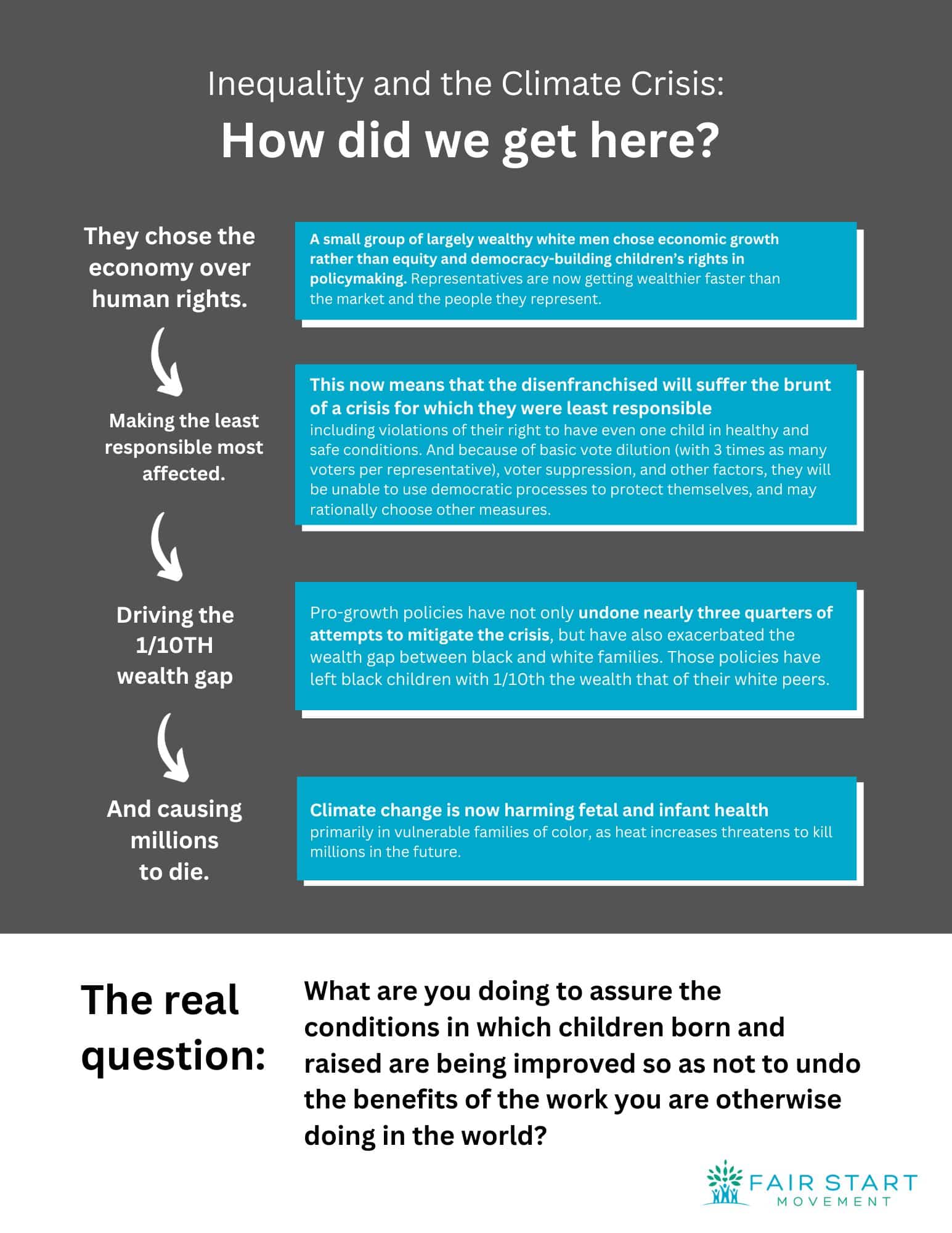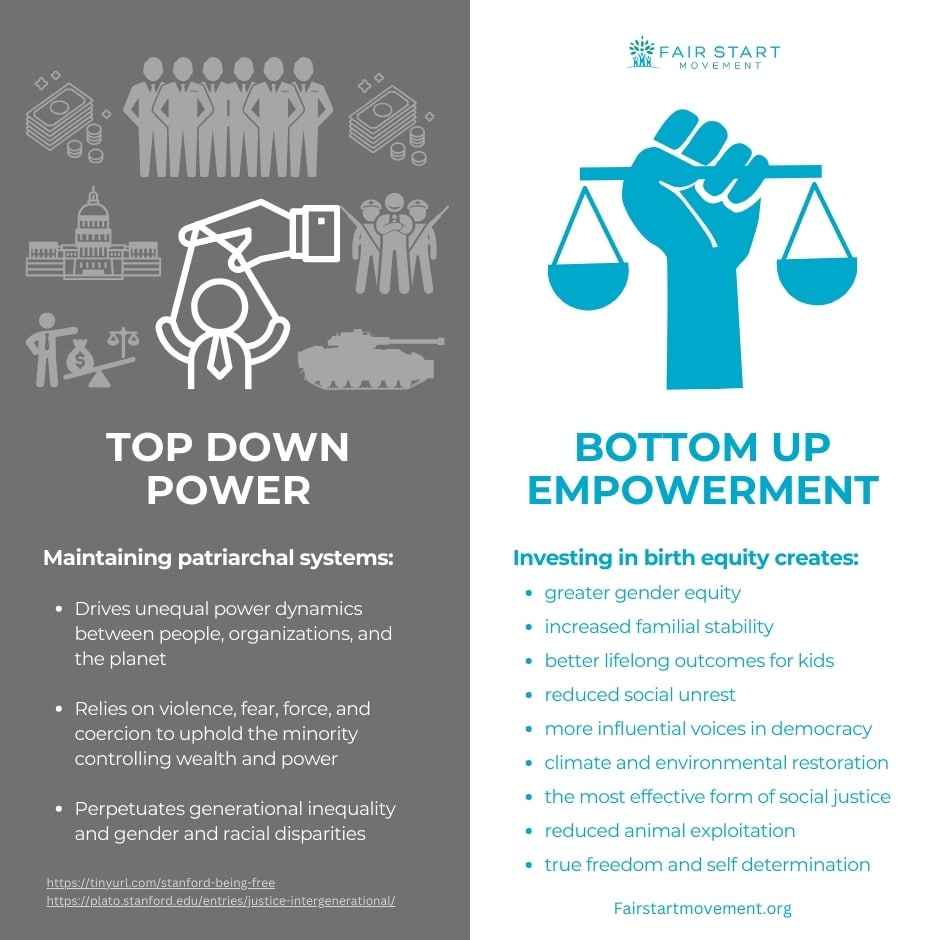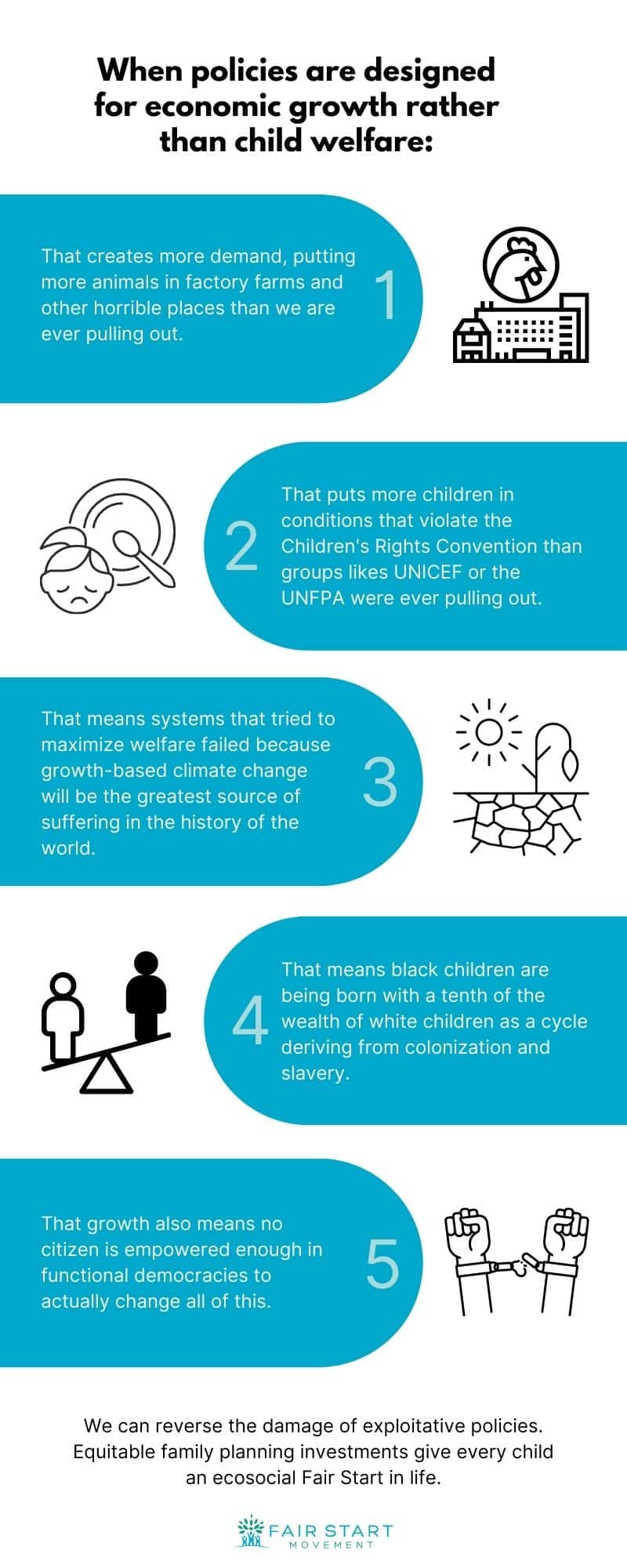A mistake in mid-20th century environmental policymaking allowed extreme wealth to be made at deadly cost to others, and according to a growing body of peer-reviewed research, in violation of the most fundamental human right. As the climate worsens we can move that extreme wealth into reparations and save lives or let many, who did not caused the crisis, die. No legitimate nation will choose the latter.
- In the wake of the horrors of World War II the United Nations limited state sovereignty with human rights obligations that protect inherent rights to self-determination for each person.
- Self-determination or freedom, among equals, begins by definition with birth and development conditions that empower each person with a role in making the law and thus protecting the fundamental capacity for each to choose who has influence or power over them. That includes climatological influence by fossil fuel companies. That is the value of birth equity – being included with an equal and influential share of control and thus freedom from and with others. We are empowered by a first principle that empowers all. By almost every theory of legitimacy, we are obligated to follow the law, as opposed to the rules of religion for example, because we are supposed to be included in the processes that create the law, offsetting each other’s voice equally as we grow because we are politically equal. That is why the law is allowed to be dominant and we are obligated to follow it. This legal equity is not meant to be abstract, but reflected in how – because we were emancipated by our childhoods – we interact with each other every day and the specific sense of empowerment and freedom we should feel.

- But rather than meet this standard and the handful of concrete benchmarks that measure it – like investing heavily in young women inverse to their wealth, as well as ensuring the human right to a natural (or nonhuman/self-determining) environment – between 1948 and 1968 world leaders opted for less expensive interventions that protected existing concentrations of wealth. They also chose legal systems that evaded inclusion and participation, instead using violence and other forms of coercion. They hid the crucial importance of birth positionality and equity behind parental (which often meant patriarchal) autonomy, religion, and the state sovereignty that should have been contingent upon it. The family planning system they used wasn’t even sustainable of its own values for more than a handful of generations, with many would-be parents today feeling their choices limited (climatologically, for example) by the choices of those who came before. That growth, enabled by a lack of obligation to ensure children their rights, alone caused a significant amount of deadly climate emissions.
- These men made fundamental decisions, in international agreements, about costs, benefits and valuation without meaningfully including those who would be affected – which would have been the first logical move. To be clear: This meant legally enforceable entitlements, like the being born with a million-dollar trust fund while other children died in infancy from lack of resources, were premised on a standard for legitimacy the nations responsible never had to meet. If there is meritocracy today, it is because some use birth positionality to exclude others, and on their own define merit with arbitrary criteria like gross domestic product, that have now created an ecological crisis killing millions.
- This mistake fundamentally drives – on many levels – the climate crisis today, in terms of emissions, how we experience their impacts, how our legal systems are able to respond to the crisis, etc.
- The most just and effective response to the crisis is to finally meet the legitimacy standard, and move wealth made at deadly cost to others into family planning and birth equity reparations. Until we do this, some benefit at deadly cost to others, most of whom had little role in creating the crisis. No form of justice should tolerate that, and it’s unclear how we are obligated to follow the laws of such a system.
- Most crucially, the extreme wealth that could otherwise save lives in the form of family planning reparations is amassed, held and often backing the industries causing the crisis, despite this illegitimacy.
- Many who benefited from this mistake and amassed significant wealth and power will go far to avoid this discussion and reduce their climate liability, using their money to offer decoy alternatives and fake forms of social justice, create noise, and fearmonger around the idea that equity is a threat to economic growth, or autonomy (when it actually must precede autonomy, as is implied by the equal “we” premise we find in all constitutions). They will ignore the necessary first premise, that of consensual collective action, missing from almost all population ethics of the past, the ethics that enabled the crisis. Remember that their influence, including the valuation used to decide who is influential, was derived from a coercive system of entitlements that never sufficiently included others in the process to obtain the legitimacy those in power pretended it had. Many of those not included will suffer and die in heat waves as a result.
- We can force the illegitimacy discussion by asking one question, for ourselves and others: What are we doing to assure the conditions in which children born and raised, including their environment and resources, are being improved so as not to undo the benefits of the work we otherwise do? Legitimacy, or including others, is fundamental. This is not like other work. We are all obligated to it because it comes first: It’s about who we should be in terms of our most fundamental, or dominant, relations. To the extent we personally are not doing this work, we remain part of unjust systems of benefit because the first move in governance – choosing who has power over us – should derive from the people, not the government.

- In the world today there is a robust system of investing in young women. One thing we can all do is help move that system quickly towards climate and ecological restoration by urging the United Nations to treat birth equity – defined above – as the first and overriding human right, to use that as the baseline for climate justice and liability, and escalate reparative payments as planning entitlements.
- Any lesser standard robs those harmed of what justice entitles them, and hides the primacy of their right/obligation to physically constitute just nations and legitimate power relations – a right that logically comes before any justification of the state to use violence to protect extreme wealth made at deadly cost to others.
- But we cannot wait for the same governments who enabled the crisis, and other concentrations of wealth and power who benefit from illegitimacy and have conflicts of interest, to act. Many millions of lives are at stake. Also, because the first move in governance should derive from the people, not the government, we should act first.

- Some are already paying these reparations and can role model their behavior and influence others to do the same. One method of starting this conversation involves finding instances in where those you want to give have used misleading language, like the word “sustainable,” to mask a system from which they benefitted at deadly cost to others. Show them the facts, the primacy of children’s rights, and the horror stories that come from ignoring them – the horrific child abuse and suffering of animals that comes from growth and lack of equity planning, the brutal weight of being born to work while others thrive, how heat actually kills someone, how little control many actually have over their futures – of what is actually going on. As an attorney/employee I had to omit these facts from claims I made about the impact of my work, even though it made the claims inaccurate. Seeing my own specific role in harming others through something as fundamental as language, and my use of it to perpetuate lies about the legal system I was using and the world around me spurred me to act.
- Relate these things to the basic values they will have pursued throughout their lives, e.g., seeking minimum thresholds of personal welfare, expecting equal access to opportunities, participating in and adhering to political/legal systems that purported to represent the governed, using and enjoying an environment relatively conducive to human and nonhuman health, enjoying a right to have a child in relatively safe conditions, etc. Urge them to see their role in a system robbing others of these things and to change course in the ways they can.
- Fair Start is urging two leading California institutions, Stanford University and the California Attorney General, to change in just this way.
- There are dozens of other actions you can take.

